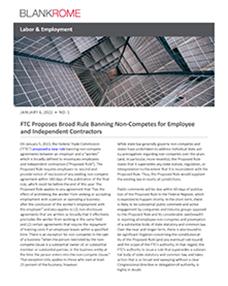FTC Proposes Broad Rule Banning Non-competes for Employees and Independent Contractors
On January 5, 2023, the Federal Trade Commission (“FTC”) proposed a new rule banning non-compete agreements between an employer and a “worker,” which is broadly defined to encompass employees and independent contractors (“Proposed Rule”). The Proposed Rule requires employers to rescind and provide notice of rescission of any existing non-compete agreement within 180 days of the publication of the final rule, which could be before the end of this year. The Proposed Rule applies to any agreement that “has the effect of prohibiting the worker from seeking or accepting employment with a person or operating a business after the conclusion of the worker’s employment with the employer” and also applies to (1) non-disclosure agreements that are written so broadly that it effectively precludes the worker from working in the same field and (2) certain agreements that require the repayment of training costs if an employee leaves within a specified time. There is an exception for non-competes in the sale of a business “when the person restricted by the non-compete clause is a substantial owner of, or substantial member or substantial partner, in the business entity at the time the person enters into the non-compete clause.” That exception only applies to those who own at least 25 percent of the business, however.
While state law generally governs non-competes and states have undertaken to address individual state policy prerogatives regarding non-competes over the years (and, in particular, more recently), the Proposed Rule states that it supersedes any state statute, regulation, or interpretation to the extent that it is inconsistent with the Proposed Rule. Thus, the Proposed Rule would supplant the existing law in nearly all jurisdictions.
Public comments will be due within 60 days of publication of the Proposed Rule in the Federal Register, which is expected to happen shortly. In the short term, there is likely to be substantial public comment and active engagement by companies and industry groups opposed to this Proposed Rule and its considerable overbreadth in rejecting all employee non-competes and preemption of a substantial body of state statutory and common law. Over the near and longer term, there is also bound to be significant litigation concerning the constitutionality of the Proposed Rule (and any eventual rule issued) and the scope of the FTC’s authority. In that regard, the FTC’s authority to issue a rule that supersedes a substantial body of state statutory and common law, and takes action that is so broad and sweeping without a clear Congressional directive or delegation of authority, is highly in doubt.
In the interim, companies cannot afford to sit on the sidelines, inactive in the rule-making process. Companies should be actively engaged through public comments or through the engagement of legislative affairs teams to persuade legislators and the administration to reconsider the Proposed Rule. Additionally, every company should take a hard look at any agreements it has that contain non-compete agreements, including employee, independent contractor, or equity incentive agreements, to determine the potential risks to confidential information, customer relationships, and specialized training if the Proposed Rule is made final, so that such legitimate business interests may be protected in other ways.
The FTC’s notice of the Proposed Rule followed actions the FTC announced on January 4, 2023, that it had taken against three companies and company executives for violation of Section 5 of the FTC Act—prohibiting unfair or deceptive acts or practices in or affecting commerce. Specifically, the FTC took action against a Michigan-based security guard company and its two owners based on the company’s requirement that all of its security guards sign non-compete agreements. Separately, the FTC took action against two companies in the glass manufacturing sector because the non-competes they imposed restricted what the FTC considered to be highly specialized workers and deprive competitors of access to such qualified employees.
The Proposed Rule is the direct culmination of an executive order issued in July 2021, encouraging the Chair of the FTC to consider working with the FTC to exercise its statutory rulemaking authority under the FTC Act to “curtail the unfair use of non-compete clauses and other clauses or agreements that may unfairly limit worker mobility.” The misuse of non-compete agreements for lower-wage workers has led to an increase in state legislation banning the use of non-competes at certain income thresholds, as well as other protective measures to provide advanced notice to workers regarding the requirement of non-compete obligations.
The addition of the provision regarding non-disclosure agreements to this Proposed Rule also follows at least two courts finding that overbroad confidentiality agreements were to be analyzed as restrictive covenants and restraints on trade. See Brown v. TGS Mgmt. Co., LLC, Cal. App.5th 303 (2020); TLS Mgmt. v. Rodriguez-Toledo,966 F.3d 46 (1st Cir. 2020).
For more information or assistance, contact Leigh Ann Buziak or Kevin Passerini, or another member of Blank Rome’s Labor & Employment practice group.*


